
Shocking Blue was a Dutch rock band formed in The Hague in 1967. They were part of the Nederbeat movement in the Netherlands. The band had a string of hit songs during the counterculture movement of the 1960s and early 1970s, including "Send Me a Postcard" and "Venus", which became their biggest hit and reached number one on the U.S. Billboard Hot 100 and many other countries during 1969 and 1970. The band sold 13.5 million records by 1973 but disbanded in 1974. Together with Golden Earring they are considered the most successful Nederbeat-band, if the criterion is scoring hits abroad and especially in the United States.
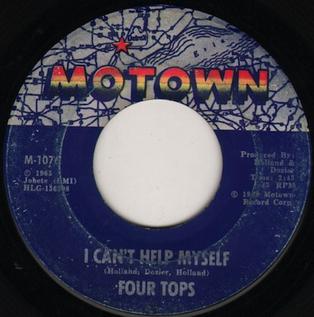
"I Can't Help Myself" is a 1965 song recorded by the Four Tops for the Motown label.
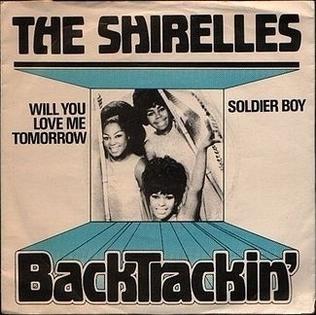
"Will You Love Me Tomorrow", sometimes known as "Will You Still Love Me Tomorrow", is a song with words by Gerry Goffin and music composed by Carole King. It was recorded in 1960 by the Shirelles at Bell Sound Studios in New York City, and hit number one on the Billboard Hot 100 chart. The song was the first by an African-American all-girl group to reach number one in the United States. It has since been recorded by many other artists, including a version by co-writer King released on her 1971 album Tapestry.

"Heat Wave" is a 1963 song written by the Holland–Dozier–Holland songwriting team. It was first made popular by the Motown vocal group Martha and the Vandellas. Released as a 45 rpm single on July 9, 1963, on the Motown subsidiary Gordy label, it hit number one on the Billboard Hot R&B chart—where it stayed for four weeks—and peaking at number 4 on the Billboard Hot 100.
"When You Walk in the Room" is a song written and recorded by Jackie DeShannon. It was initially released as a single on November 23, 1963, as the B-side to "Till You Say You'll Be Mine". It was re-released as an A-side in September 1964, and later included on the album Breakin' It Up on the Beatles Tour. The single charted on the US Billboard Hot 100, peaking at number 99.

The discography of American rhythm and blues singer Diana Ross, the former lead singer of the Supremes, consists of 26 studio albums and 116 singles. Throughout her career, Ross has sold over 100 million records worldwide. Billboard ranked her as the 47th Greatest Artist of all time and the 11th Greatest Hot 100 Female Artist of all time. In 1993, Guinness World Records crowned Ross as the "most successful female artist in music history". Her 11th studio album "Diana" remains the best-selling album of her career, selling more than 10 million copies and album equivalent units around the world.
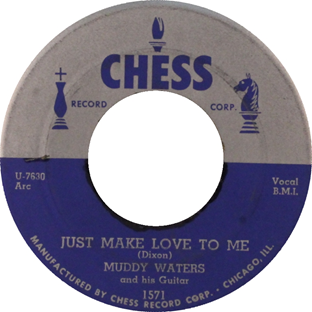
"I Just Want to Make Love to You" is a blues song written by Willie Dixon. In 1954, it was recorded by Muddy Waters, and released as a single with the title "Just Make Love to Me". The song reached number four on Billboard magazine's R&B Best Sellers chart.

The discography of American pop rock duo Sonny & Cher consists of five studio albums, eight compilation albums, one soundtrack album, two live albums and twenty-three singles. Sonny and Cher had released three albums and one single which achieved Gold status in the United States: Look At Us, Sonny & Cher Live, All I Ever Need Is You and I Got You babe. In the decade they spent together, Sonny and Cher sold over 40 million records worldwide.

"Rock the Boat" is a song by American trio The Hues Corporation, written by Wally Holmes. "Rock the Boat" was first featured on their 1973 debut studio album Freedom for the Stallion. It was released as the third single from the album in early 1974, to follow up Stallion's title song, which had peaked at number sixty-three on the Hot 100, and "Miracle Maker " which did not chart.

"Don't Pull Your Love" is the debut single by Hamilton, Joe Frank & Reynolds which became a top ten hit single in 1971. The song was written by Brian Potter and Dennis Lambert.
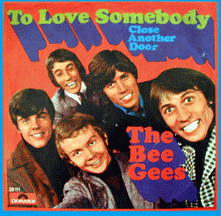
"To Love Somebody" is a song written by Barry and Robin Gibb. Produced by Robert Stigwood, it was the second single released by the Bee Gees from their international debut album, Bee Gees 1st, in 1967. The single reached No. 17 in the United States and No. 41 in the United Kingdom. The song's B-side was "Close Another Door". The single was reissued in 1980 on RSO Records with "How Can You Mend a Broken Heart" as its flipside. The song ranked at number 94 on NME magazine's "100 Best Tracks of the Sixties". It was a minor hit in the UK and France. It reached the top 20 in the US. It reached the top 10 in Canada.
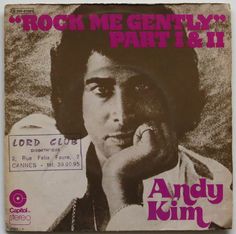
"Rock Me Gently" is a song by Andy Kim, released as a single in 1974.

"Never My Love" is a pop standard written by American siblings Don and Dick Addrisi, and best known from a hit 1967 recording by the Association. The Addrisi Brothers had two Top 40 hits as recording artists, but their biggest success as songwriters was "Never My Love". Recorded by dozens of notable artists in the decades since, in 1999 the music publishing rights organization Broadcast Music, Inc. (BMI) announced it was the second most-played song on radio and television of the 20th century in the U.S.

If Not for You is the debut studio album by British-Australian singer-songwriter Olivia Newton-John, released in November 1971 by Festival Records. The album was released on the Pye International label in the UK as Olivia Newton-John, with a slightly different cover. As a covers album, If Not for You features mostly songs previously recorded from contemporary artists of the 1960s and early 1970s. She made several performances to promote If Not for You and her follow-up album, Olivia, including an international tour with British singer Cliff Richard. It was her first album released by Festival Records, which would release all her albums in Australia until its dissolution in 2005. It also has Newton-John's first works with her long-time musical partner, John Farrar.
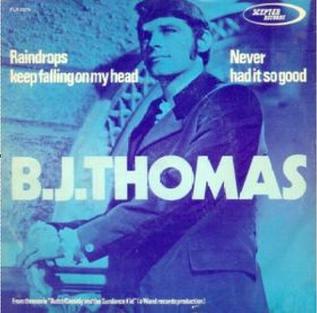
"Raindrops Keep Fallin' on My Head" is a song written by Burt Bacharach and Hal David for the 1969 film Butch Cassidy and the Sundance Kid. The uplifting lyrics describe somebody who overcomes his troubles and worries by realizing that "it won't be long till happiness steps up to greet me."

"Early in the Morning" is a song by British band Vanity Fare, released as a single in June 1969. It became an international hit, peaking at number 8 on the UK Singles Chart and number 12 on the Billboard Hot 100 and was awarded a gold disc for sales over one million.

The singles discography of American country musician Tammy Wynette contains 65 singles, 6 music videos, 3 promotional singles and 2 featured singles. Wynette signed with Epic Records in 1966 and her debut single "Apartment No. 9" was released the same year. Her single "Your Good Girl's Gonna Go Bad" (1967) became a major hit, reaching number 3 on the Billboard Hot Country Singles chart. Its follow-up singles: "My Elusive Dreams", "I Don't Wanna Play House", "Take Me to Your World" and "D-I-V-O-R-C-E", became number 1 hits on the Hot Country Singles chart.

The singles discography of American country music artist Lynn Anderson contains 72 singles, three promotional singles, one charting B-side, two music videos and nine other song appearances. She signed her first recording contract with Chart Records in 1966. The following year, her single "Ride, Ride, Ride" debuted on the Billboard Hot Country Singles chart. Also in 1967, her single "If I Kiss You " became her first major hit when it reached number five on the country singles chart. Anderson had a series of hits that reached the top ten and 20 during the 1960s including "Promises, Promises" (1969), "No Another Time" (1968), "Big Girls Don't Cry" (1968) and "That's a No No" (1969).

Uptown Country Girl is a studio album by American country artist Lynn Anderson. It was released in February 1970 on Chart Records and was produced by Slim Williamson. It was Anderson's seventh studio release in her recording career and contained a total of ten tracks. Two tracks were released as singles. Both "He'd Still Love Me" and "I've Been Everywhere" became major hits on the Billboard country chart between 1969 and 1970.

The singles discography of American country singer-songwriter Bill Anderson contains 84 singles, three promotional singles, 6 other charted songs and four music videos. After signing to Decca Records in 1958, Anderson released a series of early singles that became hits, reaching the top ten and 20. This included "That's What It's Like to Be Lonesome" (1958), "The Tip of My Fingers" (1960) and "Po' Folks" (1961). The following year, he reached number one on the Billboard Country and Western Sides chart with "Mama Sang a Song." In 1963, Anderson released his most commercially successful single, "Still." The song was his second number one country single and his first top ten hit on the Billboard Hot 100, climbing to number eight. His follow-up single, "8×10" reached similar crossover success. Anderson released 11 more top ten country hits during the rest of the decade. This included the number one singles "I Get the Fever" (1966) and "My Life " (1969). He also had a number one hit with Jan Howard called "For Loving You" in 1968. Anderson also had top ten hits with "I Love You Drops" (1965), "Happy State of Mind" (1968) and a cover of "But You Know I Love You" (1969).



















